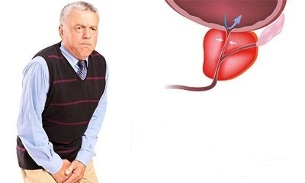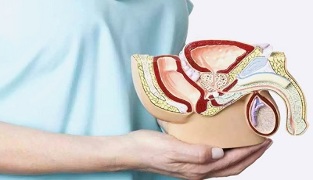
This insidious disease is one of the most common diseases in the male half of humanity. Many close their eyes before the onset of malaise and wait for the inevitable development of all sorts of consequences that make a normal life impossible. We talk about the symptoms and treatment of prostatitis in men.
Prostatitis is an inflammation of the prostate gland that, according to statistics, affects a large number of men of any age. As early as the age of thirty, one in three suffers from this disease, the number of patients has inevitably increased over the years, and almost everyone who has changed their sixties is facing one form or another of the disorder. And that’s just official data, but in fact the incidence rate is much higher, but due to the reluctance of men to see a doctor, doctors simply can’t give exact numbers.
From an early age, boys are taught that a real man must be persistent, endure pain, and not pay attention to disease. And there is no question of having to go to the doctor for the slightest inconvenience. This rule is strictly adhered to by the majority of adult men who, in the most extreme cases, talk to their doctors about their problem, and sometimes even in an ambulance or hospital.
Unfortunately, this also applies to prostatitis. The first alarming "bells" such as the need for frequent toilet visits, sometimes mild pain and discomfort when urinating, problems with libido and strength, anything to explain: hard work day, scandal with the boss, too stormy party the day before.
And the point is - there's nothing to think about, everything goes away on its own. There is a part of logic in this: the first signs of prostatitis in men are somewhat pronounced, cause minimal discomfort to the patient, and soon disappear. Only one thing is ignored: the painful symptoms are gone, but the disease itself is not gone. It only becomes a chronic form that does not manifest itself in any way for a long time, then worsens under the influence of negative factors and causes much more suffering.
Even if it seems to you that emerging health problems are worthless and will soon go away without any treatment, know that they can be the harbingers of a serious illness. Be sure to see a doctor, perform the test and perform the necessary tests. Remember that any disease is easier and faster to cure if you take it urgently.
Causes of the disease
Prostatitis can be caused by a variety of factors, often with nothing to do with the reproductive system. This is one of the insidious features of the disease.
List the most common causes of inflammation of the gland:
- Pathogenic microorganisms are one of the main causes of disease. Initially, a person can get any infectious disease: from urinary tract infections, from sexually transmitted diseases to tonsillitis, sinusitis, bronchitis or hemorrhoids, which in this case are unexpected. Even untreated tooth decay can cause prostate problems in the future. From the farthest parts of the prostate gland, pathogens enter through the flow of blood, lymph and other biological fluid. To this must be added the weakening of the immune system in almost everyone, because under normal immunity, a common cold is unlikely to be accompanied by inflammation of one of the organs of the reproductive system.
- Circulatory disorders in the small pool - this reason is rightly second on the list. Blood stagnation, disruption of the normal blood supply, and consequently lack of organ oxygen due to physical inactivity, constant work and home sessions. This leads to a significant increase in the size of the prostate. Similar changes are observed in overweight people.
- Frequent tremors and tension in the muscles of the perineum are prone to certain occupations, such as drivers.
- Hormonal imbalance - occurs in many diseases and has a very negative effect on prostate health.
- Hypothermia.
- Frequent constipation.
In order to reduce the likelihood of the disease, the regularity of sexual activity should be monitored. Keep in mind that both persistent abstinence and too frequent intimate contact have negative effects.
What forms of the disease are isolated

- Bacterial prostatitis- caused by pathogenic bacteria. It can be acute (more common in young people) and chronic. Recent studies have shown that, in general, the infection affects already abnormally altered tissues of the gland with severe circulatory disorders.
- Non-bacterial or abstract prostatitis- although laboratory tests do not show the presence of pathogenic microorganisms in the patient's organ, their involvement in the process cannot be completely ruled out.
- Prostatodynia- all symptoms of prostatitis are present, but no inflammation of the gland is detected.
How does prostatitis manifest
To recognize the disease in time, you need to know what the symptoms of prostatitis are in men. The most characteristic features are the acute form of the disease.
- Weakness and general malaise.
- Chills and fever.
- Increased body temperature.
- Headache.
- Severe pain in the perineum and groin that worsens during urination and defecation.
- You need the toilet, and soon after urinating, the patient feels the urge again because the bladder is not completely emptied.
- Severe conditions that require urgent medical attention are expressed in acute urinary retention.
- Nervous tension, irritability.
Symptoms of chronic prostatitis
In its chronic form, the disease can be asymptomatic for many years, and its symptoms can be easily confused with the manifestation of other diseases.
Find out how this disease manifests itself:
- Pain in the pelvis and lower back- the pain comes from the perineum, it can be felt in the lower abdomen, urethra, testicles. In addition, the patient feels that low back pain radiates toward the foot, which can often be confused with sciatica or other neuralgia. Maybe the pain is concentrated in one place, or it all seems to hurt together.
- Difficulty and frequent urination- Pain usually occurs when the patient begins to urinate or stops urinating. However, it is impossible to tolerate and hold back urine: even though the man recently went to the toilet, the feelings are as if the bladder is full. When urinating in a weak stream, very little urine is released.
- Decreased sexual activity- Prolonged inflammatory process, circulatory disorders, abnormal changes in prostate tissue cannot be wasted, and may eventually lead to a noticeable decrease in libido and potency. This is because the nerves pass through the glands, which transmit impulses to the centers of the brain responsible for erections. One of the consequences of the disease is damage to these nerves, a decrease in their sensitivity and the development of disorders in the intimate sphere. At first, the erection does not lose its strength, however, premature ejaculation occurs, then the erection itself becomes much weaker and the orgasm becomes slow. Testosterone synthesis can be gradually inhibited and sexual desire is catastrophically reduced. In some cases, when ejaculating, a person feels sharp pain in the head of the penis.
- Scarring of prostate tissue and decrease in organ size.In advanced cases, this process spreads to the urinary tract and bladder, causing severe urinary disorders. All this leads to the development of kidney problems, urolithiasis and other serious conditions.

Treat different forms of the disease
We’ve seen the most common symptoms of prostatitis in men, now let’s look at ways to treat the disease.

Although many studies deal with the treatment of prostatitis, the general system of therapy is still unknown. Treatment may vary from case to case, but there is no doubt that it is very important to correctly determine the cause of the disease and to start therapy at an early stage in the development of the pathology.
In case of acute prostatitis of bacterial genesis, the patient should be hospitalized, receive antibiotic therapy, prescribe anti-inflammatory, analgesic, circulatory drugs.
The chronic form of the disease is very difficult to treat and usually does not heal completely. With successful treatment, long-term remission is achieved, during which there are no signs and symptoms of prostatitis in men.
The complex of therapeutic procedures is selected individually for each patient. The patient is given non-steroidal anti-inflammatory drugs, drugs that improve prostate blood circulation, immunomodulatory drugs, vitamins. In addition, a man should undergo a physiotherapy, prostate massage course, and perform regular physical exercises designed to maintain prostate gland health.
























